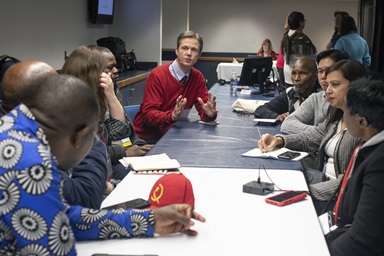Over 1,000 counter-demonstrators gathered in Charlottesville, Virginia, in response to a July 8 rally of approximately 30 to 40 Ku Klux Klan members.
The Charlottesville Clergy Collective was among the leaders of the anti-racism organizations involved in the response. Its 30 members — including five United Methodist clergy from three congregations — hosted a "Safe Space" at First United Methodist Church, blocks from the rally site. That space was used by more than 600 people. Non-violence training, prayer, water and music were offered.
"We have successfully stood up and said 'This is not a good thing,'" the Rev. Harry Kennon, pastor emeritus at First Church, pointed out. "We can't let what we perceive to be evil in here. We have to push back."
At the Klan rally site, the chanting and horn-blowing of counter-demonstrators rendered the words of the Klan inaudible at a distance of more than a couple of feet.
"Our activities are part and parcel of being Methodist," explained the Rev. Jan Rivero, lead pastor of Wesley Memorial United Methodist Church. "This is pushing us to find ourselves. All of these different organizations — we're all doing the same thing. We bring to the table the social justice of Wesley. We feel a strong voice to be the voice of the oppressed."
The Rev. Phil Woodson, associate pastor at First United Methodist Church, is in his first year of ministry.
"When I came to First Methodist a year ago," Woodson said, "I don't know what I would have done if they had told me that, in a year, I would be dealing with the Klan. It certainly is not what I expected.
"It has affected me deeply," he continued. "The clergy is all moving in the right direction. This has connected me to the tradition of the church in a new way. Every generation has its own problems. Wesley fought oppression, child labor and slavery. We are doing the same, just in different times."
Numerous simultaneous events, including a daylong concert, lectures and panel discussions and family-oriented activities, occurred throughout the downtown area, planned for those who wanted to stand in protest to the Klan but not to attend the rally.
The rally became a focal point for the Ku Klux Klan from various states after being announced by the Loyal White Knights of the Ku Klux Klan in Pelham, North Carolina.
The Grand Dragon of that group, Christopher Barker, was unable to attend the rally as he is not permitted to leave a two-county area of North Carolina under the terms of his bail for stabbing anther Klan member in December. The Loyal White Knights is estimated to have lost about 80 percent of its membership since Barker's arrest, according to Nate Thayer, a journalist who writes extensively about the KKK.
The on-site leader became Virginia Grand Dragon James Moore, who is reported to reside approximately 125 miles from Charlottesville.
Home to the University of Virginia, Charlottesville's population is 50,000 and the surrounding county, Albemarle has another 100.000 residents. It is an area steeped in history. Thomas Jefferson's Monticello as well as James Monroe's Ash Lawn are a short drive from downtown. Two other presidential homes (James Madison and Woodrow Wilson) are within a 45-minute drive.
Charlottesville also has a statue of Robert E Lee, which became a focal point when the city council voted to move it from the city's most predominate park to a lesser park. There was a failed attempt by a white supremacist to have the African-American vice mayor removed from office.
The dispute drew national political and media attention. Corey Stewart, a candidate for the Republican gubernatorial nomination from Northern Virginia, attempted to broadcast a Facebook Live presentation in front of Lee statue. Counter-protesters forced him to cut the attempt short. He returned a few weeks later with approximately 100 supporters.
This was followed by the announcement in late May that the KKK had received a permit a rally in Charlottesville. The community rose to plan its reaction to the July 8 event.
Another rally has been scheduled for Aug. 12 in Emancipation (formerly Lee) Park, blocks from the July 8 Klan rally site and near First United Methodist Church. The Daily Progress of Charlottesville reported that the event “is taking shape as a gathering of far-right political activists and white nationalists.” The city has issued a rally permit for 400.
Lord is a photojournalist based in New York City and Ivy, Virginia.
News Media Contact: Linda Bloom, 615-742-5470 or [email protected]. To read more United Methodist news, subscribe to the free Daily or Weekly Digests.
Like what you're reading? Support the ministry of UM News! Your support ensures the latest denominational news, dynamic stories and informative articles will continue to connect our global community. Make a tax-deductible donation at ResourceUMC.org/GiveUMCom.




